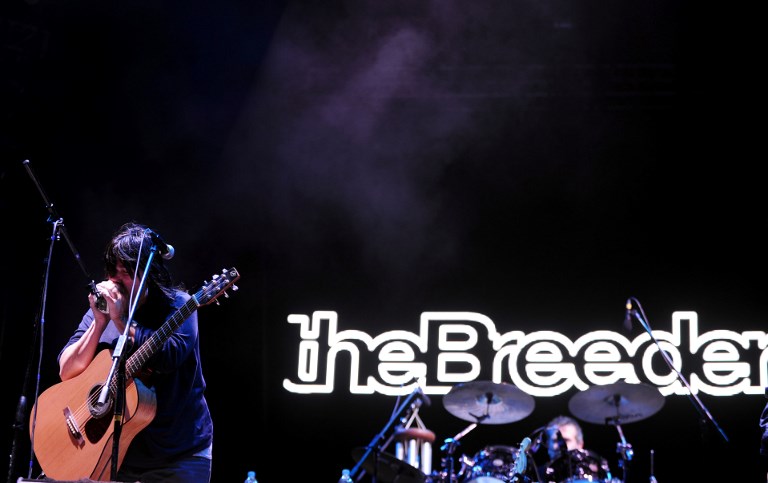

by Shaun TANDON
Agence France-Presse
NEW YORK, United States (AFP) — When The Breeders reunited in 2013 to mark 20 years since “Last Splash,” it looked like a straightforward nostalgia tour for an album that had become an alternative rock cornerstone.
“We had a great time and people responded and loved it. And then we started getting calls to do shows in 2014 and so, hmmm, that was technically not a 20th anniversary anymore,” Kim Deal, The Breeders’ frontwoman, said with a robust laugh.
“People would say, ‘We don’t care, we just want you guys to play.’ We could do any songs. And it just opened up a whole new thing,” she told AFP by telephone from her hometown of Dayton, Ohio.
The fruition is “All Nerve,” which comes out Friday and is the first album to bring back together The Breeders’ classic lineup from 1993’s “Last Splash.”
Despite The Breeders’ enduring influence on a generation of artists, the intervening 25 years produced their share of internal friction, as well as substance abuse struggles, that inhibited the band’s rebirth.
“All Nerve,” to be accompanied by an extensive tour, manages to revive The Breeders’ brand of insouciant grunge that struck such a chord in the alternative rock era while still sounding fresh.
Deal — until 2013 also the bassist of alternative rock icons the Pixies — infuses the music with reverb-hazy guitar and her distinctly sandy yet warm voice.
The Breeders initially started as a side project for Deal, who shares guitar duties with her twin sister Kelley. Josephine Wiggs plays a dominant bass — so exemplified by “Cannonball,” the signature song off “Last Splash,” whose bass salvo slinks both high and low — while Jim Macpherson cranks up the band’s volume with his vigorous drums.
The lyricism is both self-reflective and surreal.
“Good morning!” Deal bellows at the start of the album on “Wait in the Car.”
“Consider, I always struggle with the right word. Meow meow meow meow meow meow,” she bellows with a force more punk than a housecat.
‘Organic’ songwriting
The title track on “All Nerve” manages to be tender and bellicose at once. “You don’t know how much I missed you,” she sings, before the guitars crush forward and she warns: “I won’t stop. I will run you down.”
Deal said the song’s lines came into her head spontaneously one morning before she presented it to the band for one of its decidedly low-tech jam sessions.
“It was very organic,” she said. “We’re not a laptop band; there is never a laptop in the room.”
The Breeders recorded the album in three studios including Chicago’s Electrical Audio with Steve Albini, the producer known for his raw, heavy sound, most notably in his work with Nirvana.
“Blues on the Acropolis,” the album’s closing track, reflects sadly on how so many world monuments are also known for drunkards and rabble-rousers.
“Walking with a Killer” eerily recounts the fright strolling the outer stretches of US Route 35 that cuts through Dayton, the military city where Deal was born and returned to help care for her Alzheimer’s-stricken mother.
“I think every town has their creepy backroads. They have cornfields that come right to the side with cars whizzing past,” Deal said.
“It’s a summer night with the crickets and the headlights are coming your way. It really writes itself, doesn’t it?” she said, her voice building with enthusiasm.
Leading woman bandleader
If “Last Splash,” which made the Rolling Stone and Pitchfork lists of best albums of the 1990s, came out when alternative rock was entering the mainstream, “All Nerve” coincidentally appears at a very different moment — with rock arguably losing prominence and much of the broader entertainment world galvanized by activism.
Asked for her thoughts on the #MeToo movement against sexual harassment, Deal — one of the most prominent women in alternative rock — paused and reflected. Small incidents, she recalled, in retrospect reflected the double standards for women.
She recounted an incident when Wiggs needed bass equipment while in Dayton and the store owner insisted on a hug — behavior Deal doubted any man would encounter.
But women, Deal said, have always been part of rock — just that power brokers, from concert bookers to journalists, did not always embrace them.
“Just because you don’t find woman bands in festivals this year doesn’t mean there aren’t any women in bands. They’re just not getting invited,” she said.
© Agence France-Presse
